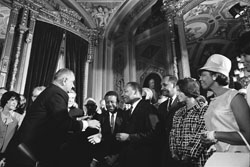The Supreme Court will hear arguments Wednesday in a case that challenges key provisions in the Voting Rights Act of 1965. The landmark legislation was designed to make voting a reality for blacks in the south and stamp out practices that continued to block them from the polls nearly 100 years after the U.S. Constitution guaranteed minorities the right to vote. The court will hear an Alabama case challenging sections in the law that require states and municipalities with a history of racial discrimination – mostly in the south – to seek federal approval for any changes to their voting rules and voting districts.
Lorraine C. Minnite, a professor of public policy at Rutgers-Camden and author of The Myth of Voter Fraud, argues that the law should be kept intact. She cites recent examples of states that have adopted racially discriminatory voting rules and argues that such laws threaten the integrity of elections. Minnite has signed on to an amicus brief in the case in support of the law.

Minnite: Congress took the unusual step of including provisions to ensure that states and jurisdictions with the most egregious records of voter discrimination could no longer use poll taxes, discriminatory tests, complicated rules and other devices to evade the highest law of the land and deny minorities representation and their right to vote. The Act has been reauthorized four times by Congress, most recently in 2006, and each time with significant bi-partisan support.
The case before the Supreme Court, Shelby County, Alabama v. Holder, challenges two parts of the Voting Rights Act: Section 5 known as the “preclearance” provision, and the section that sets out a formula for identifying jurisdictions that fall under the rule. The formula adopted by Congress identifies jurisdictions with the most significant history of voting discrimination. A jurisdiction covered by these sections must seek pre-approval with the U.S. Department of Justice or a three-judge panel of the U.S. District Court of the District of Columbia for any changes in election law before those changes may go into effect.
Rutgers Today: Did the provisions in the Voting Rights Act play any role in recent court decisions regarding voter ID laws before the 2012 presidential election? Are there examples of why this provision is still necessary, or do you think it is no longer needed?
Minnite: Section 5 prevented the states of South Carolina and Texas from implementing stringent photo identification laws that surely would have discriminated against racial minorities.
There is no question that Section 5 is still needed. Numerous contemporary examples of states passing racially discriminatory voting-related rules abound. In 2006, the only black city councilman in Calera, Ala., lost his re-election bid when the boundaries of his council district were redrawn, reducing the district’s black voting-age population from 71 percent to 30 percent.
Last year, a three-judge panel rejected Texas’s congressional redistricting plan on the grounds that it was intentionally discriminatory toward Latinos, having found similar constitutional violations in the state’s redistricting plans four other times in the previous four decades. Another three-judge panel rejected a Florida law that would have reduced the state’s early voting period because of its potentially discriminatory impact on African-American voters. As the plaintiffs in Shelby County point out, fewer and fewer of the voting changes submitted to the Justice Department for approval are being blocked on grounds of racial discrimination than ever before. This is not due to Section 5’s failure, but rather, to its success.
Rutgers Today: What does it mean if the provisions are struck down? How will it affect access to voting? Will it make it easier for states to adopt voter ID laws or other provisions that may present challenges to some voters?
Rutgers Today: What is the broader implication of overturning this provision in the law? Why should people care about this case if they don’t live in states or jurisdictions that will be affected?
Minnite: Erwin Chemerinsky, a University of California at Irvine law professor, said that if the Supreme Court finds the preclearance provision unconstitutional, it will be the first time since the late 19th century that the Court has struck down a major civil rights law. We all should care about the Shelby County case, not only because of the enormous symbolic value of the Voting Rights Act and what it has meant to the struggle for civil and voting rights in the United States, but because in a democracy, a harm of this kind to a few is a harm to all. Elections marred by discriminatory rules and skewed voter participation lack integrity and result in flawed public policies that do not meet the needs or reflect the views of the broader community.
Media Contact: Andrea Alexander
732-932-7084 ext. 615
E-mail: aalexander@ur.rutgers.edu